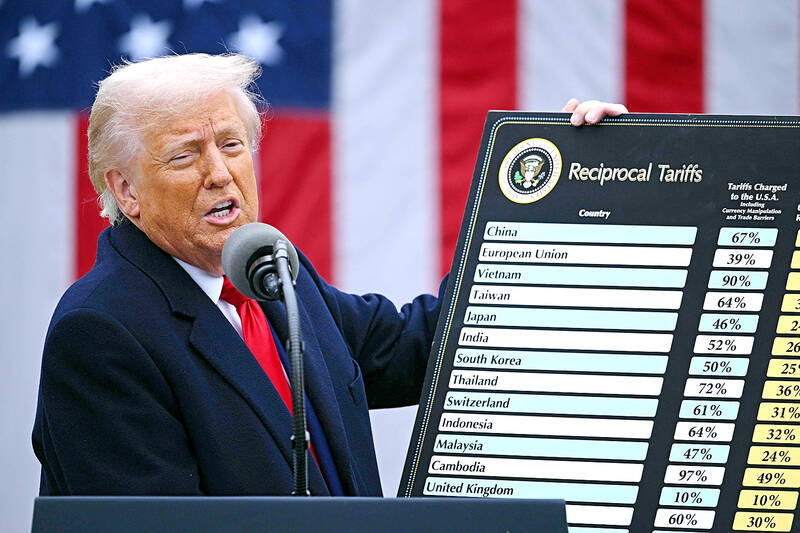A US federal court on Wednesday blocked most of US President Donald Trump’s sweeping tariffs from going into effect, boosting markets yesterday even as the White House appealed against the decision by “unelected judges.”
Trump’s trade policies have roiled financial markets with planned import levies aimed at punishing economies that sell more to the US than they buy.
Trump said that the trade deficits and the threat posed by the influx of drugs constituted a “national emergency” that justified the tariffs.

Photo: AFP
However, the three judges of the US Court of International Trade ruled that Trump had overstepped his authority, barring most of the restrictions announced since he took office in January.
The White House said that “unelected judges” have no right to weigh in on Trump’s handling of the issue.
“President Trump pledged to put America first, and the administration is committed to using every lever of executive power to address this crisis and restore American greatness,” Trump’s spokesman Kush Desai said.
Attorneys for the administration filed to appeal the ruling.
One of Trump’s White House aides, Stephen Miller, wrote on X: “The judicial coup is out of control.”
Trump unveiled sweeping import duties on most trading partners on April 2, at a baseline 10 percent, plus steeper levies on dozens of economies, including China and the EU.
Taiwan faced 32 percent tariffs.
The ruling also quashes duties that Trump imposed on Canada, Mexico and China separately using emergency powers.
Some of the turmoil was calmed after he paused the larger tariffs for 90 days and suspended other duties, pending negotiations with individual countries and blocs.
Asian markets rallied yesterday after the ruling, while European and US futures also pointed to early gains.
Japan’s tariffs envoy Ryosei Akazawa said as he left for a fourth round of talks in Washington that Tokyo — reeling from tariffs on vehicles — would study the ruling.
The federal trade court was ruling in two separate cases — brought by businesses and a coalition of state governments — arguing that the president had contravened the US Congress’ power of the purse.
“The question in the two cases before the court is whether the International Emergency Economic Powers Act [IEEPA] of 1977 delegates these powers to the president in the form of authority to impose unlimited tariffs on goods from nearly every country in the world,” the three-judge panel wrote in an unsigned opinion.
“The court does not read IEEPA to confer such unbounded authority and sets aside the challenged tariffs imposed thereunder,” it added.
Additional reporting by staff writer

FREEDOM OF NAVIGATION: The UK would continue to reinforce ties with Taiwan ‘in a wide range of areas’ as a part of a ‘strong unofficial relationship,’ a paper said The UK plans to conduct more freedom of navigation operations in the Taiwan Strait and the South China Sea, British Secretary of State for Foreign, Commonwealth and Development Affairs David Lammy told the British House of Commons on Tuesday. British Member of Parliament Desmond Swayne said that the Royal Navy’s HMS Spey had passed through the Taiwan Strait “in pursuit of vital international freedom of navigation in the South China Sea.” Swayne asked Lammy whether he agreed that it was “proper and lawful” to do so, and if the UK would continue to carry out similar operations. Lammy replied “yes” to both questions. The

SECOND SPEECH: All political parties should work together to defend democracy, protect Taiwan and resist the CCP, despite their differences, the president said President William Lai (賴清德) yesterday discussed how pro-Taiwan and pro-Republic of China (ROC) groups can agree to maintain solidarity on the issue of protecting Taiwan and resisting the Chinese Communist Party (CCP). The talk, delivered last night at Taoyuan’s Hakka Youth Association, was the second in a series of 10 that Lai is scheduled to give across Taiwan. Citing Taiwanese democracy pioneer Chiang Wei-shui’s (蔣渭水) slogan that solidarity brings strength, Lai said it was a call for political parties to find consensus amid disagreements on behalf of bettering the nation. All political parties should work together to defend democracy, protect Taiwan and resist

By refusing to agree spending increases to appease US President Donald Trump, Spanish Prime Minister Pedro Sanchez threatened to derail a summit that NATO Secretary-General Mark Rutte needs to run smoothly for the sake of the military alliance’s future survival. Ahead of yesterday’s gathering in The Hague, Netherlands, things were going off the rails. European officials have expressed irritation at the spoiler role that Sanchez is playing when their No. 1 task is to line up behind a pledge to raise defense spending to 5 percent of GDP. Rutte needed to keep Spain in line while preventing others such as Slovakia

SHIFT PRIORITIES: The US should first help Taiwan respond to actions China is already taking, instead of focusing too heavily on deterring a large-scale invasion, an expert said US Air Force leaders on Thursday voiced concerns about the Chinese People’s Liberation Army’s (PLA) missile capabilities and its development of a “kill web,” and said that the US Department of Defense’s budget request for next year prioritizes bolstering defenses in the Indo-Pacific region due to the increasing threat posed by China. US experts said that a full-scale Chinese invasion of Taiwan is risky and unlikely, with Beijing more likely to pursue coercive tactics such as political warfare or blockades to achieve its goals. Senior air force and US Space Force leaders, including US Secretary of the Air Force Troy Meink and